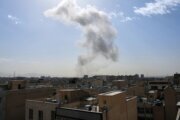J.J. Green, wtop.com
WASHINGTON – Iran and Saudi Arabia have never been close allies. The gulf widened suddenly early this fall when the Department of Justice announced Iran allegedly was plotting to kill the Saudi ambassador.
“The Iranians … I can’t even begin to understand what the motivation would have been behind the attempt,” says Eric H. Holder, U.S. attorney general, during an interview at his office.
Fred Burton, vice president of intelligence at Stratfor, says the answer was simple.
“I think from a motivation standpoint they just believed they could get away with it.”
Questions have surfaced about the integrity of the case. Iranian leaders claim the allegations are false. Iran’s parliament speaker, Ali Larijani, dismissed the case saying, “America wants to divert attention from problems it faces in the Middle East, but the Americans cannot stop the wave of Islamic awakening by using such excuses.”
However, Holden says, “as the case develops people will see how serious a threat it actually was, how determined they actually were in their actions.”
On Sept. 29, Manssor Arbabsiar, a 56-year-old naturalized U.S. citizen, living in Texas and holding both Iranian and U.S. passports, was arrested at New York’s Kennedy International Airport and charged with plotting to assassinate the Saudi ambassador to the U.S. in Washington. He was allegedly acting as an agent of the Iranian government.
According to charging documents, Arbabsiar was working with Gholam Shakuri, an Iran-based member of Iran’s Qods Force, which is a special operations unit of the Iranian Islamic Revolutionary Guard Corps (IRGC).
According to government audio recordings, revealed in the criminal complaint, Arbabsiar allegedly traveled to Mexico and met with a middle-man who promised to connect him with several Mexican drug cartel members to carry out the attack for $1.5 million.
Burton says Arbabsiar chose Mexico because “if you look at border security in general they probably chose Mexico because you can operate under the chaos. I’ve had some very frank conversations with the Mexican security services and their foreign counter-intelligence capabilities are very poor.”
There was a similar plot in Los Angeles.
“About 18 months ago or so in Wikileaks, it was revealed that the Iranians tried to assassinate a dissident in Los Angeles as well a VOA [Voice of America] broadcaster with a home in London,” Burton says.
Jamshid Sharmad was the dissident in Los Angeles.
“There was no doubt, they were behind the plot,” Burton says. “The police found documents indicating they were behind it. It was very clear from the beginning that the Iranian government was behind it.
“The notion that they were going to kill the Saudi ambassador here in the United States,” says Holder, is a significant escalation in the view that Iran is a dangerous adversary.
“It was just circumstance or chance that the person they reached out to had a connection to our government and we were able to foil the plot in that way.”
An unusual visit by Iran’s intelligence chief to Saudi Arabia this week sought to discredit U.S. claims that Tehran planned to kill the ambassador to Washington. A senior Iranian said on Wednesday the U.S. and Israel are trying to pit the two countries against each other.
Related Stories:
Follow J.J. Green on Twitter
(Copyright 2011 by WTOP. All Rights Reserved.)







